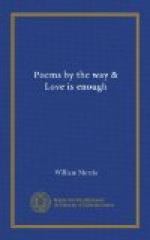Now, therefore, while yet thou art little and hast no thought of thine own, I will tell thee a word of the world; of the hope whence thou hast grown; Of the love that once begat thee, of the sorrow that hath made Thy little heart of hunger, and thy hands on my bosom laid. Then mayst thou remember hereafter, as whiles when people say All this hath happened before in the life of another day; So mayst thou dimly remember this tale of thy mother’s voice, As oft in the calm of dawning I have heard the birds rejoice, As oft I have heard the storm-wind go moaning through the wood; And I knew that earth was speaking, and the mother’s voice was good.
Now, to thee alone will I tell it that thy mother’s body is fair, In the guise of the country maidens Who play with the sun and the air; Who have stood in the row of the reapers in the August afternoon, Who have sat by the frozen water in the high day of the moon, When the lights of the Christmas feasting were dead in the house on the hill, And the wild geese gone to the salt-marsh had left the winter still. Yea, I am fair, my firstling; if thou couldst but remember me! The hair that thy small hand clutcheth is a goodly sight to see; I am true, but my face is a snare; soft and deep are my eyes, And they seem for men’s beguiling fulfilled with the dreams of the wise. Kind are my lips, and they look as though my soul had learned Deep things I have never heard of. My face and my hands are burned By the lovely sun of the acres; three months of London town And thy birth-bed have bleached them indeed, “But lo, where the edge of the gown” (So said thy father) “is parting the wrist that is white as the curd From the brown of the hand that I love, bright as the wing of a bird.”
Such is thy mother, O firstling, yet strong as the maidens of old, Whose spears and whose swords were the warders of homestead, of field, and of fold. Oft were my feet on the highway, often they wearied the grass; From dusk unto dusk of the summer three times in a week would I pass To the downs from the house on the river through the waves of the blossoming corn. Fair then I lay down in the even, and fresh I arose on the morn, And scarce in the noon was I weary. Ah, son, in the days of thy strife, If thy soul could but harbour a dream of the blossom of my life! It would be as the sunlit meadows beheld from a tossing sea, And thy soul should look on a vision of the peace that is to be.
Yet, yet the tears on my cheek! and what is this doth move My heart to thy heart, beloved, save the flood of yearning love? For fair and fierce is thy father, and soft and strange are his eyes That look on the days that shall be with the hope of the brave and the wise. It was many a day that we laughed, as over the meadows we walked, And many a day I hearkened and the pictures came as he talked; It was many a day that we longed, and we lingered late at eve Ere speech from speech was sundered, and my hand his hand could leave. Then I wept




